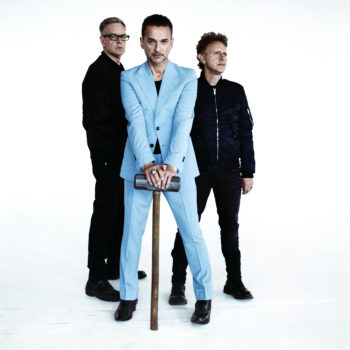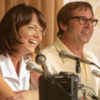Back in the early ’80s, four lanky Brits calling themselves Depeche Mode, armed only with primitive synthesizers, started churning out pop hits. Nearly 40 years later they’ve sold over 100 million albums and are one of the most popular live acts on Earth. This week they’ll become the first band ever to play four consecutive sold-out shows at the Hollywood Bowl in Los Angeles. (Last week they were nominated for the Rock ‘n’ Roll Hall Of Fame.)
Rico spoke to Mode’s main songwriter, Martin Gore, and his fellow founding member, Andy Fletcher. They told him the band was originally inspired by the pioneering German synthesizer band Kraftwerk. But according to Andy, they cut their teeth with more traditional instruments. Find out how they made the switch to synth, what influenced their darker material, and more.

Andy Fletcher: We were actually more of a conventional band in the beginning, and only Martin had a synthesizer. That’s when these very small and cheap monophonic synthesizers were available. And Vince Clarke, who was our leader at the time, made a decision that we were to become all electronic.
Rico Gagliano: Just a sort of blanket rule? It was like, “Today, we become synth rockers!”
Andy Fletcher: And in fact, up ’til the late ’80s, I don’t think we ever picked up another guitar.
Martin Gore: Yeah. I think there was one track that was a B-side or something.
Andy Fletcher: “And Then.” “And Then.”
Martin Gore: Oh yeah, yeah, yeah. “And Then.” You’re right. That had a bit of guitar on it. Yeah.
Rico Gagliano: What was your response to that? Were you excited to go down that road?
Andy Fletcher: Well it was very hard for me, because I’d never played a keyboard in my life. So that was pretty tough.
Rico Gagliano: And of course, the keyboards at that time were incredibly primitive. It wasn’t always easy to make them work, is my understanding.
Martin Gore: Yeah. Things you take for granted these days were very, very difficult back then.
Rico Gagliano: Like for instance, what?
Martin Gore: The most disastrous story we have, I think, was when we played in a place called Bochum, in Germany, in about 1982. And we were using a prototype PPG synthesizer back then, and they were renowned for being… not very roadworthy.
We heard that Kraftwerk [was] coming to the gig. And, of course, it broke down. So, for the whole set, the synth that I played just wasn’t working. So it was quite disastrous and quite humiliating in front of our idols.
Rico Gagliano: Oh my God, did you speak to them afterwards?
Martin Gore: No, they left!
Andy Fletcher: They thought, “No competition.”
Rico Gagliano: The music of your early days, it was — if I may say so — a little more poppy. And then, fairly quickly, it became quite dark. You began to attract fans who tended to favor a lot of black in their outfits, let us say.
What prompted that tonal shift? I mean I know it was actually kind of a dark political moment at that time, certainly in England.
Martin Gore: I think more than anything else it was just growing a little bit older. You know, when we were making “Speak & Spell,” we just couldn’t believe our luck. We were just along for the ride with Vince. And then, suddenly, Vince left the band and I was kind of thrown into the hot seat.
Rico Gagliano: Because he was the main songwriter until he left, and then you became it.
Martin Gore: Yeah, so with “Construction Time Again,” which came out in 1983, I think that was the first real signs of promise, I suppose, that we could do something different than just churning out pop music.
Rico Gagliano: I’m actually very glad you brought up that album because it has my favorite Depeche Mode song on it: “Everything Counts.” Can you tell us a little bit about that song? What was the genesis of it.
Martin Gore: I think up until “Spirit,” “Construction Time Again” was the only album that was kind of social commentary. And, I think it was just down to us traveling a lot. You know, we did our first Asian tour and we saw more poverty and stuff like that.
I mean, England wasn’t exactly a great place at the time. But it kind of puts things into perspective when you travel to Thailand and places like that. I think that’s what influenced that album, and that track in particular.
Rico Gagliano: This might be a good time to talk about your most recent single called, “Where’s the Revolution?” What inspired that track?
Martin Gore: You know, I started writing songs for this album toward the end of 2015. And I just felt the world was in a horrible place. Humanity seemed to be losing its way. “Where’s the Revolution?” was just one of those tracks. It feels like we need to be doing something. We need to be finding our way back to the path.
Rico Gagliano: The song almost seems to be scolding listeners for being complacent. And it’s kind of begging for a popular uprising — almost literally, that’s what the chorus is — but as I was listening, it occurred to me that there is kind of a political revolution afoot… but it’s in the form of populism.
Andy Fletcher: That’s interesting. When Martin felt the world was in a bad place in 2015, I mean… a lot’s happened since then, like Brexit. And I don’t think Martin is alluding to the revolution of populism. But actually, it’s been very good for us, releasing the album now, because it really seems to be… really now. And that’s important.
Rico Gagliano: Obviously populism is not what you’re calling for. But what happens when there’s a revolution happening, but it’s not the revolution you were hoping for? What do you do when the people rise up, but not in the way you wish?
Martin Gore: I’ve thought about that, and it’s a shame that maybe what I was feeling back in 2015 was just a lot of anger and a lot of frustration by people. And, unfortunately, it seems to have been misplaced and put into populism. And the world is a much worse place for it.
Rico Gagliano: Your work has been cited as an influence by innumerable bands. Which musicians were you maybe most proud to learn you inspired?
Martin Gore: One of the things I love about all the different people that cite us as influences is that they come from so many different genres. If it had just been, like, electronic musicians saying, “We were inspired by you,” that would be fantastic. But it wouldn’t be as amazing as the fact that we’ve inspired some heavy metal people.
Rico Gagliano: Which?
Martin Gore: I remember once… I swear I saw somewhere once… Anthrax.
Andy Fletcher: To be honest though, I think the thing that Martin’s most proud of is the Johnny Cash version of “Personal Jesus.”
Rico Gagliano: Oh, right! Johnny Cash’s cover.
Andy Fletcher: Martin was into Johnny Cash when you were young, weren’t you?
Martin Gore: Yeah. One of my friends called me and said, “I just heard Johnny Cash singing ‘Personal Jesus’ on the radio.” And I said, “You’re joking!” [Andy laughs.] I honestly did not believe him.
Rico Gagliano: Did you expect — especially with a form of music that was so at the time very edgy and very novel — did you expect to still be doing it this many years later?
Martin Gore: No. I mean…
Andy Fletcher: We thought we’d last a few years.
Martin Gore: If that. When people ask us, “What are you most proud of in your career? What moment?” You know, they want us to be, like, very specific about it. The thing that I’m most proud of is that we’re still here 37 years later. I mean that is amazing to me.
Rico Gagliano: That and the Johnny Cash.
Martin Gore: Yeah, and that. That as well [laughs].


